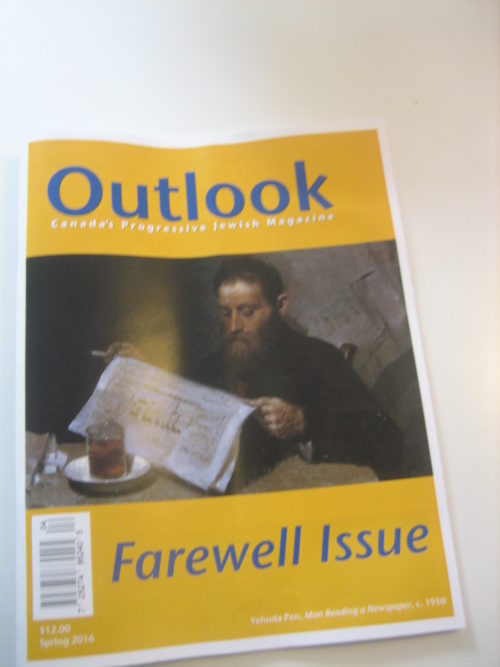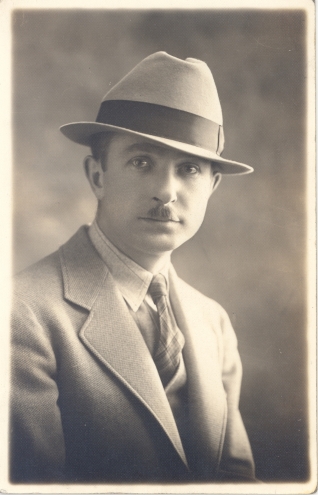The latest edition of Outlook magazine, dated Spring 2016, arrived in my mailbox on June 6, and much to my surprise, a headline at the bottom of the catchy cover blared, “Farewell Issue.”
I needn’t have been surprised.
Outlook, which billed itself as Canada’s only progressive Jewish magazine and which I read for some 30 years, had been on life support for years, reliant on donations from a dwindling base of readers/supporters to keep its head barely above the water.

As editor Carl Rosenberg wrote in a lament in the 39-page edition, “We have struggled uphill for quite a while with the difficulties and expenses of sustaining a print publication with a small and specialized — although devoted — readership, and we must finally let go.”
Its managing editor, Sylvia Friedman, put it more personally. In an interview in the final edition, she said, “There were times when we had to hold on to our checks for a week or two and then we’d ask, ‘Can we cash our checks now?'”
During its waning years, Friedman was a part-time employee, working three days a week from home for the princely salary of $183 (Canadian). Rosenberg, its sole fulltime employee, earned more than Friedman, but he was not paid overtime.
In the end, Outlook progressively lost readership and financial stability as its elderly subscribers passed on and as printing and mailing costs became prohibitively expensive.
“We’re very mad at Canada Post,” said Friedman. “Not the workers. They love to see us. There’s a difference between the workers and the bosses.”
Outlook, whose circulation of 3,000 peaked in the 1990s, was strictly a shoestring operation — a labor of love published by the Canadian Jewish Outlook Society out of a small office in Vancouver’s Peretz Centre for Secular Jewish Culture.
Like Jewish Currents, its sister publication in the United States, Outlook was financially and morally supported by readers with a socialist/humanist perspective.
Outlook‘s last edition carried several tributes, letters and comments from readers, a raft of articles on current events, pieces on the Yiddish writer Sholem Aleichem and the Canadian novelist Adele Wiseman, a selection of Yiddish poetry and several book reviews, including one about the career of U.S. presidential aspirant Bernie Sanders.
Outlook‘s inaugural 16-page edition appeared in Toronto in October 1963, having evolved from an English-language insert in the Vochenblatt (Weekly Paper), a left-wing, or “linker,” Yiddish periodical which emerged in the 192os.
Due to the declining health of its editor, Joshua Gershman, the Vochenblatt closed in 1978.
Outlook, which moved its headquarters to Vancouver in 1979, was steeped in secular Yiddish language and culture and was guided by a prophetic Jewish vision. Its pages were open to diverse viewpoints — liberal Zionist, non-and anti-Zionist, Yiddishist, Marxist, feminist, anarchist, social democratic and environmentalist.
It covered the Canadian and international scene, paid close attention to Israel and the Arab-Israeli conflict and published Yiddish poetry in Yiddish.
Devoted to building a besere, shenere velt — a better, more beautiful world — it fought against the plague of racism and economic and gender inequality and worked for a just peace in the Middle East, supporting a two-state solution and the end of Israel’s occupation of the West Bank.
As Rosenberg observed in his final column, “Goodbye and Thanks,” Outlook was written, edited and read by people who had been actively involved in the United Jewish People’s Order (UJPO), a socialist political, cultural and educational fraternal organization founded in Canada 90 years ago.
With branches in Toronto, Montreal, Winnipeg and Vancouver, UJPO had some 2,500 members at its height in the 1950s.
Expelled from the Canadian Jewish Congress in 1951 due to its opposition to German rearmament, UJPO was readmitted in 1995.

UJPO broke with the Communist Party, then known as the Labor Progressive Party, in 1956 after one of its leaders, J.B. Salsberg, returned from a fact-finding mission to the Soviet Union and reported that Jewish culture was being suppressed and that antisemitism was state policy.
As a result of his trip, Salsberg left the party and UJPO, claiming it had been insufficiently critical of the Soviet Union. One-third of UJPO’s members joined Salsberg in forming a successor organization, the New Fraternal Jewish Association.